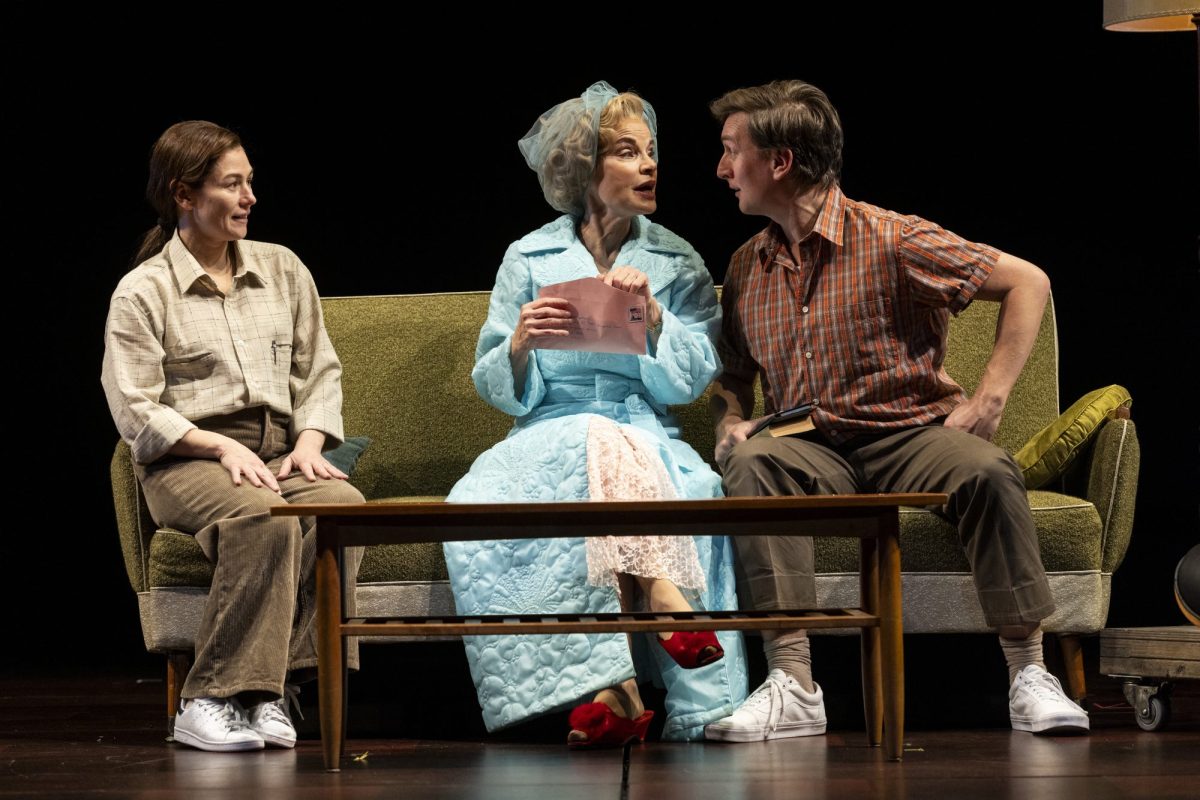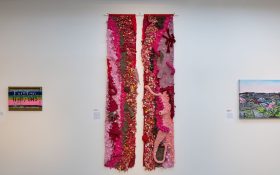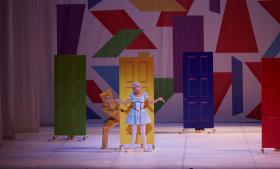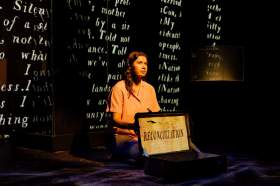Mother Play – a play in five evictions is the Melbourne Theatre Company’s (MTC) premiere of a show by Pulitzer-winning playwright Paula Vogel that opened on Broadway last year. The semi-autobiographical work rides from the 60s through to the 21st century, capturing decades of cultural change through the domestic minutiae of a single family in Washington DC.
The play begins when Martha, now middle-aged, comes across a box of her brother’s belongings that effectively transports her back to her childhood in episodic memory bursts.
We meet the Hermans: siblings Martha (Yael Stone) and Carl (Ash Flanders) and their mother Phyllis (Sigrid Thornton) in reduced circumstances, unpacking their belongings in yet another apartment. Or rather, the kids, in their early teens, are the ones doing the work: Phyllis (decked out in a fur coat and sunglasses like a faded diva) is more concerned with lighting up a ciggie and finding a gin glass. There’s an air of bored resignation; she’s been here many a time restructuring her life (“family in family out”).
The play’s subtitle offers a preemptory look at the events to come; there will be no housing stability. Five evictions (and many more cocktails) are in the offing before the show is over. Christina Smith’s simple set involves the same pieces of furniture rearranged in different formations Tetris-like across the various new addresses.
The cheating, ne’er do-well father and husband of this unit is conspicuously absent, and it’s left to Phyllis, now a reluctant single parent, to corral the family – a role for which she seems eminently unsuitable, and struggles with the entirety of Mother Play. The push and pull, fractious and tender relationships of the trio are played out with a see-saw tone of light and dark.
Stone, Flanders and Thornton acquit their roles enthusiastically and effectively, owning their characters’ particular idiosyncrasies. It’s not easy to age decades within a short duration, but with the help of appropriate music and costumes and the actors’ own inflections and physicality, we get a sense of time passing. And yet the more things change, the more things stay the same.
The dynamic between the three is established from the outset. Mother favours her precocious, verbose, flamboyant son, bathing him in the glow of her approbation, while her daughter – mousey and insecure, is relegated to the shadows of her considerations, like an afterthought. Phyllis expects Carl to go to college; Martha can just go to secretarial school. Carl, however, rallies behinds his sister’s potential, undermining his mother by curating a reading list for Martha that includes the works of feminist icons like Betty Friedman, Simone de Beauvoir and Virginia Woolf. Remember, this is a period of sexual revolution and change, even if Phyllis is a slow adapter.
The support between the siblings is joyful to behold and one of the play’s strengths. Whatever lack in love they receive from their mother, they supply to each other in abundance. Flanders brings a camp vitality to his role while Stone, the narrator, is more grounded and less flashy, but offers the emotional sounding board between the two contending drama queens.
Leavening the heavy themes of emotional, psychological and substance abuse, there are lovely, comedic touches throughout: the wildly different ways her mother and brother teach Martha to walk, the decisive way Phyllis deals with a landlord who fails to deal with a vermin problem and the mirror ball, sparkly curtain disco scene in the 70s where Carl busts some moves. But these moments of levity are balanced by the constant tension between parent and children, the poverty-driven need to move constantly and later, more tragic events that threaten to derail the family completely.
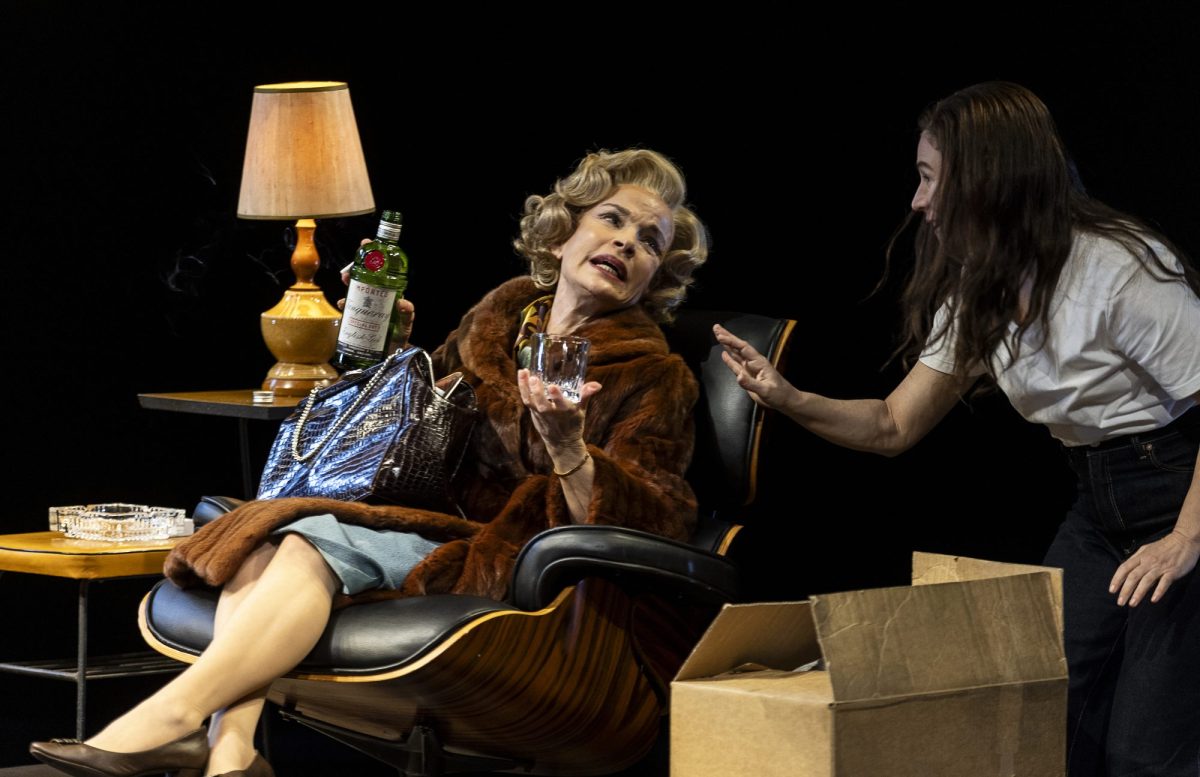
Thornton is excellent in her nuanced portrayal of Phyllis, brittle and desperate to cling on to vestiges of genteelness even under straitened conditions. She swans around with an immaculate wardrobe, even if some of the glamorous outfits are thrifted. It’s clear she’s someone to whom appearances and social niceties matter. Abandoned by her husband (who took off with the cash and the mistress) and having to subsist on a low-paying government job, here is a mother who is belligerent and world-weary, who takes her frustrations out on her children, whom she offends and castigates both deliberately and unwittingly.
As a character portrait it’s a rounded one. Sure, she receives far more nurturing than she offers and is often lost in an inebriated mess or ruminating on days of former glory, but with Vogel’s script and under Lee Lewis’ direction, we’re reminded that, like all of us, she’s a product of her upbringing and of societal mores and expectations. So, having been raised in a conservative household, it’s hardly surprising that she’d inherited, osmotically, her own parent’s beliefs. (She was told by her own mother that “the filthier a woman’s floor is, the higher her degree”). That her homophobia and internalised misogyny are demonstrated when it comes to her own offspring seems inevitable. Phyllis is no monster; she cuts an empathetic figure and is more an object of pity.
There are a few missteps in the play: an extended, unspeaking section in which Phyllis is alone, having alienated her adult children again, is unnecessarily long. Surely it does not require that much time to establish her loneliness as she moves about preparing a meal for one and with the emotional support TV in the background. Various scenes that showcase the roach-infested household are also played for laughs, with a life-size puppet in one and lighting projections that feature them dancing. These cute surreal touches feel like forced entertainment and undermine the severity of the family’s impoverishment.
Read: Theatre review: 1984, Comedy Theatre
Nonetheless, Mother Play is held together by the skill of its small cast; it’s a three-pronged affair that works because of the intra-relational play between them, where all the big emotions are let loose: anger, hurt, disappointment and yes, of course, love.
Mother Play: a play in five evictions by Paula Vogel
MTC, Southbank Theatre, The Sumner
Director: Lee Lewis
Set and Costume Designer: Christina Smith
Lighting Designer: Niklas Pajanti
Composer and Sound Designer: Kelly Ryall
Voice and Dialect Coach: Amy Hume
Associate Set and Costume Designer: Bianca Pardo
Assistant Composer and Sound Designer: John Sharp
Movement Consultant: Jonathan Homsey
AV Designer: Nevin Howell
Cast: Sigrid Thornton, Yael Stone, Ash Flanders
Mother Play will be performed until 2 August 2025.
